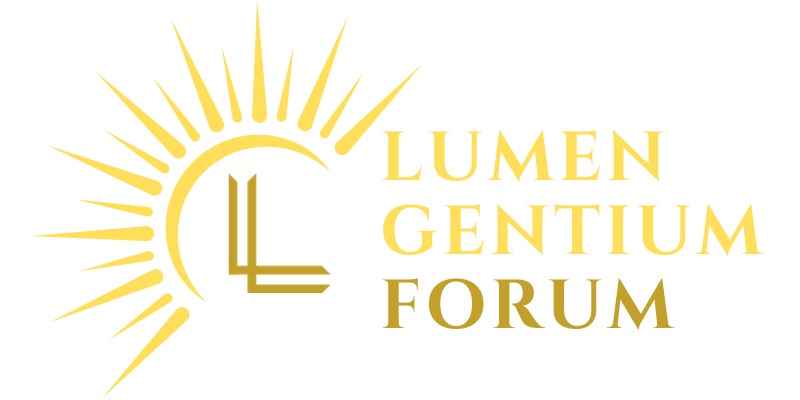
CURRICULUM & SPEAKERS
Lumen Gentium Fellows together undergo an intellectually stimulating curriculum of deep formation in Catholic social teaching and virtuous leadership, focused on their practical application in our professional lives and civic engagement.

SPEAKERS*
Lumen Gentium Fellows will hear from a diverse array of top Catholic leaders, each of whom bring deep expertise, personal vocational experience, and unique insights into living Catholic social teaching and virtuous leadership fully and faithfully.
*Please note that confirmed speakers are subject to change based on speaker availability during the cohort term.

CURRICULUM OUTLINE
Experience an intellectual and spiritual journey through the richness of Catholic social teaching and virtuous leadership. Below you will find the themes for each month of the fellowship, and corresponding questions which guide Lumen Gentium Fellows through each movement of the exploration.
MONTH 1:
CATHOLIC SOCIAL TEACHING & VIRTUOUS LEADERSHIP
Striving for Holiness & the Common Good in your Personal Mission
Human beings have a deep desire for what is good, true, and beautiful—for authenticity and authority. However, this desire is often deeply entangled in a will to power over the very definitions of these realities. How can Catholic Social Teaching and Virtuous Leadership provide important correctives that help us find healing, wholeness, holiness, and happiness by “becoming who you are”? (Pope Saint John Paul II)
How does Catholic social teaching enable us to address polarizing issues through core, foundational principles and meaningful dialogue? How does Catholic social teaching equip us in our lay vocations to advance God’s Kingdom where we are, and to share the Good News with our neighbours?
We can’t seek peace at all costs, or it will be a false peace—a compromise with injustice and evil. Christ tells us simultaneously: “Blessed are the peacemakers” (Matthew 5:9) and “I came not to bring peace but a sword.” (Matthew 10:34). How do we reconcile these two injunctions? What is the role of virtuous leadership in discerning the right path forward?
MONTH 2:
FOUNDATIONS OF HUMAN DIGNITY—MADE IN THE IMAGE OF GOD
Christian Anthropology & Humanity in the Modern World
What is the difference between the true Christian anthropology and competing ideological frameworks present in contemporary culture? How do these imagine the nature of the human being, and the human being’s relationship with society and all of creation?
What are the main differences between a Catholic vision of the dignity of human life and other visions present in Canadian cultural discourse?
How can we as Catholics engage with and evangelize our culture through this Christian anthropological vision of the human being? What are today’s pressing concerns, culturally speaking, and how do we apply a Christian anthropology to those concerns?
What is the relevance of a Christian anthropology to your own professional life and how you can contribute to the common good through your work? In what ways does your institution’s structure, mission, programs, etc, reflect a Christian anthropology (implicitly or explicitly) and in what way does it contravene a Christian anthropology? In what ways can you influence your institution towards a greater affirmation of Christian anthropology?
MONTH 3:
THE UNITY OF TRUTH: FAITH AND REASON
The “two wings on which the human spirit rises” (Pope Saint John Paul II)
What is the relationship between faith and reason? How do they complete and perfect one another? What relationship between faith and reason do we see in Canadian culture today?
Through the readings, we see that faith and reason are complementary, but we often end up emphasizing one over the other. Do you fall into this tendency, and which of the two do you find has supremacy in your own life?
Practically speaking, how do faith and reason exist in harmony, or in tension in various parts of your life, and in your professional vocation?
Does your institution embrace the relationship between faith and reason (implicitly or explicitly), or are faith perspectives relegated to a secondary position, or are not welcome at all? How can your institution better embrace the relationship between faith and reason? How could you influence your institution towards a greater respect and consideration of faith perspectives?
MONTH 4:
“BECOME WHO YOU ARE!”—FREEDOM FOR EXCELLENCE
Moral Agency, Rights, and Responsibilities
What is the meaning and purpose of human freedom?
What ideological currents and material factors in our contemporary society misuse, exaggerate and/or undermine human freedom (often simultaneously)? How can we demonstrate the difference between genuine freedom and its imitators?
To those who fear that a deeper application of Catholic Social Teaching in Canadian society will undermine rather than enhance human freedom, what can we say?
How do you use your freedom? In what ways to you exercise freedom in the journey towards excellence and holiness, and in what ways do you need to grow in your use of the great gift of freedom?
How do I, in my professional life, contribute to the positive exercise of the freedom of others? Does my institution contribute to the positive exercise of freedom of those we serve?
MONTH 5:
THE RESPONSIBILITY TO LEAD
The Catholic citizen for the Common Good
The common good is a central, permanent principle of Catholic Social Teaching. Yet that term and its meaning are highly contested in our public discourse. How do you understand the idea of the common good in what we’ve learned so far?
In Rerum novarum, Pope Leo XIII writes that “if human society is to be healed now, in no other way can it be healed save by a return to Christian life and Christian institutions.” What could the kind of Christian social renewal Pope Leo XIII calls for here look like today, and how does Pope Leo XIII distinguish between the legitimate ends of the secular State and the Church?
What are the responsibilities of the Christian when it comes to cultural engagement and leadership within the wider society? How must that engagement necessarily be evangelistic?
What virtues are required for you to cultivate an evangelistic attitude in your place of work, and in how you seek to influence your institution and our wider civil society?
MONTH 6:
THE GIFT OF LIFE
Public Bioethics in our Canadian Context
What are the most significant ways your profession and your institution—both internally and in their wider civic role—influence how human life is valued in our culture, both positively and negatively?
Where and how is the Catholic understanding of human life’s sanctity most needed in our culture today?
What aspects of human life and dignity are affirmed by Catholic social teaching, which are in turn reduced or rejected by contemporary ideologies? In what ways does Catholic social teaching more completely vision the goodness of human life?
What role can you play via your professional expertise and in your domain of action to contribute to a greater affirmation of the value and sanctity of human life in all its forms?
MONTH 7:
A CHRISTIAN ANTHROPOLOGY OF SEXUALITY & SEXUAL DIFFERENCE
“God saw everything that he had made, and indeed, it was very good.” (Genesis 1:31)
The word “anthropology” comes up again with regards to sexuality and sexual difference in the readings. What is a definition of anthropology, and why is it functional with regards to discussing the essentiality of “male and female he created them”?
How can we have conversations about these topics, which have become quite controversial of late?
How can we influence various educational systems and teachers on questions of sexuality and sexual difference in today’s Canadian society?
One of the challenges of our deeply ideological contemporary culture is that it can be a struggle to fully live a Christian anthropology, especially in social life. How can we live reality fully, as best we can, even despite these contrary ideological frameworks?
MONTH 8:
THE TRUE DEVELOPMENT OF HUMAN PERSONS
The Promotion of the Poor, Stewardship, Co-Creation, and Integral Human Ecology
How do you understand the distinction between the idea of progress and true, authentic development, as defined by the Catholic tradition?
In your profession, how have you seen the manifestation of both underdevelopment and overdevelopment? How does your institution and your industry contribute to both phenomena, and/or heal them?
What does it mean to exercise a preferential option for the poor and vulnerable? How can you in your profession and your institution better live this out?
In our readings this month, Pope Francis writes that “the Church’s social thought is primarily positive: it offers proposals, it works for change and in this sense it constantly points to the hope born of the loving heart of Jesus Christ.” What positive proposals have you begun to envision as you have deepened your understanding of Catholic social teaching and virtuous leadership?
Integral—meaning what is essential to something—and ecology, a standard of well-being based on the harmonious and proper functioning of parts considering the end of the whole, are analytical and evaluative concepts that mark the uniqueness of the Catholic understanding of the world. They afford an understanding of the natures of things, what is proper to them, and how they function well together. What does it mean to understand how things connect and what’s good for them with an ecological lens? What does it mean to identify what is essential to well-being and flourishing in our lives?
Co-creation implies joining in the task of Creation, which is primarily God’s. When God created the world, He created it good, as a sheer gift, and out of love. What does it mean to co-create, understanding it in the context of why and how God creates? What does it mean conceptually, and how is it lived out practically?
COMMISSIONING RETREAT:
BE A LIGHT TO THE NATIONS
Planning Your Christian Mission
What new insights have you gained from this program and what new questions have arisen?
What is your plan for continuing to deepen your formation in Catholic Social Teaching and Virtuous Leadership?
How will this impact your mission and work?
Retreat movements:
A vision for greatness
Reflection on your learning
Equipping to give testimony
Activation for service
Commissioning





















